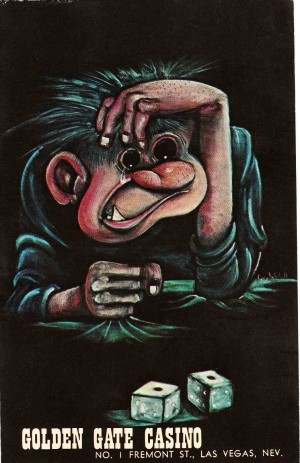Poetry
Dentologia: A Poem on the Diseases of the Teeth
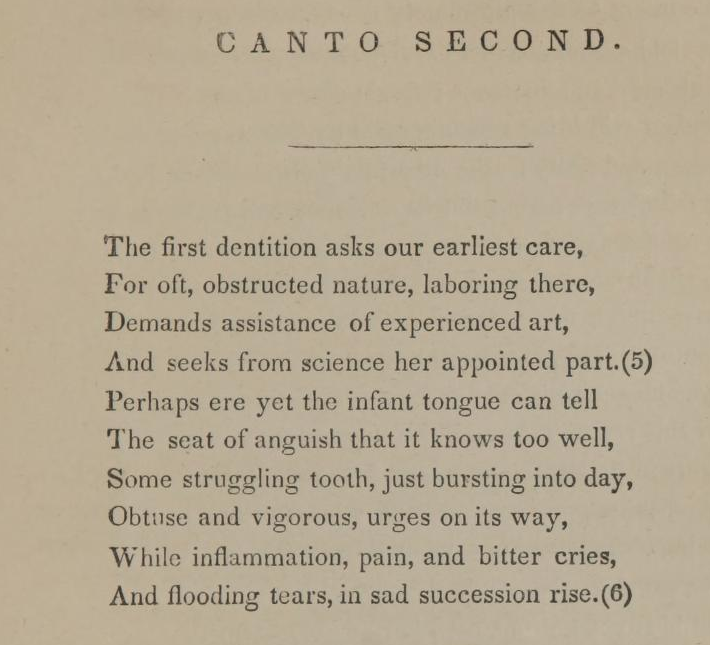
Full text here.
Thanks to Richard Bleiler.
Posted By: Paul - Fri Apr 13, 2018 -
Comments (3)
Category: Hygiene, Poetry, Nineteenth Century, Diseases, Teeth
Shakespeare, Tchaikovsky, and Jayne Mansfield
In 1964, Jayne Mansfield recorded an album for MGM that featured her reading selections from the poetry of Shakespeare, Byron, Shelley, Yeats, and others, as Tchaikovsky's music played in the background. Apparently she hoped the record would show off the asset she was most proud of, her 164 IQ.The album isn't available on CD or MP3, but you can pick up a copy of the original vinyl on eBay for around $30 or $40.
More info: wikipedia
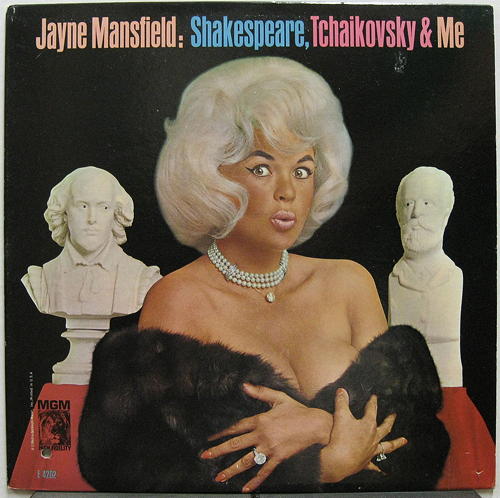
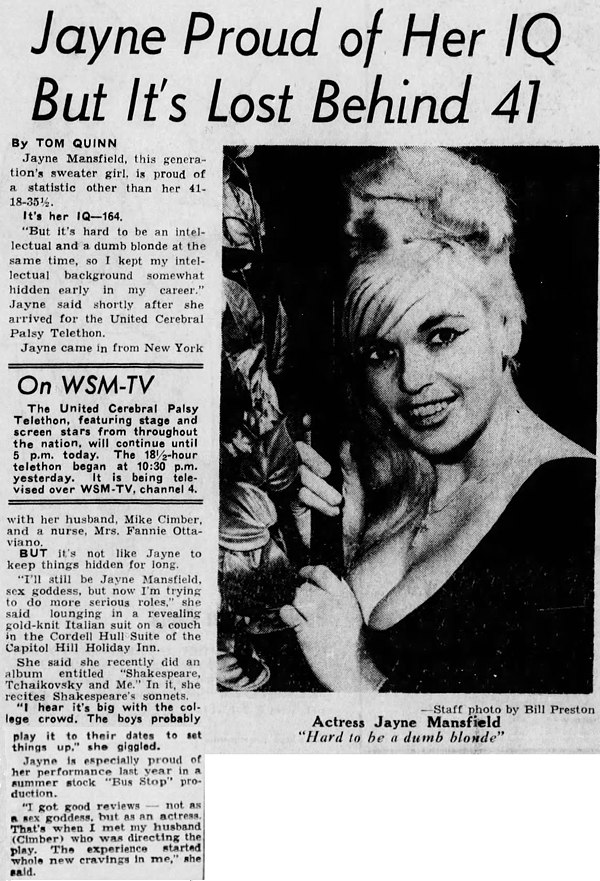
Posted By: Alex - Wed Feb 21, 2018 -
Comments (2)
Category: Celebrities, Poetry, 1960s
Staging a Left-olution
Today's post features a bunch of sinister, leftist radicals, in honor of International Left Handers Day (August 13).Also, check out the Bill of Lefts.
Posted By: Alex - Thu Aug 13, 2015 -
Comments (6)
Category: Riots, Protests and Civil Disobedience, Video, Poetry
The Woman with the Serpent’s Tongue
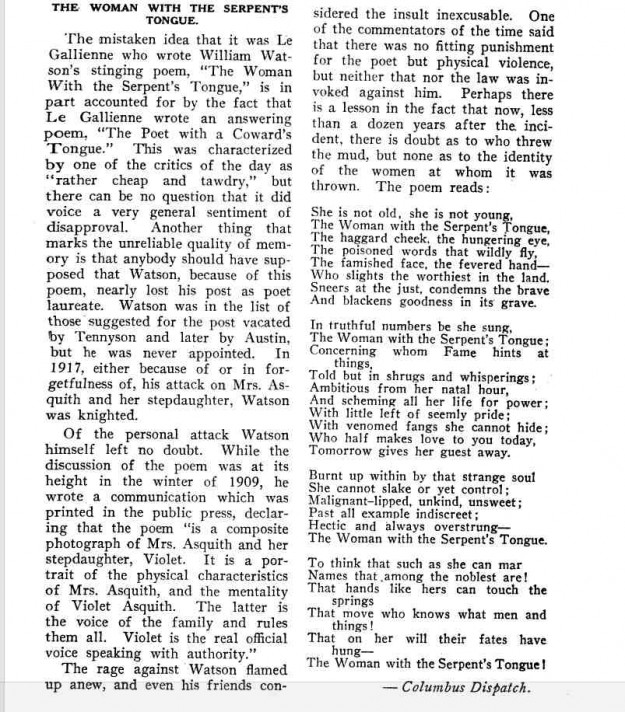
[Click to enlarge]
Original article here.
Once upon a time, poetry still mattered, and could cause great controversies. No social media for such battles, after all. This poem seems to have cost William Watson the post of UK Poet Laureate.
Posted By: Paul - Thu Aug 13, 2015 -
Comments (2)
Category: Poetry, 1900s, Women, Europe, Curses, Slurs, Insults, Vituperation, Libel and Slander
Litigation Through Poetry: Or, Texas Is Hell
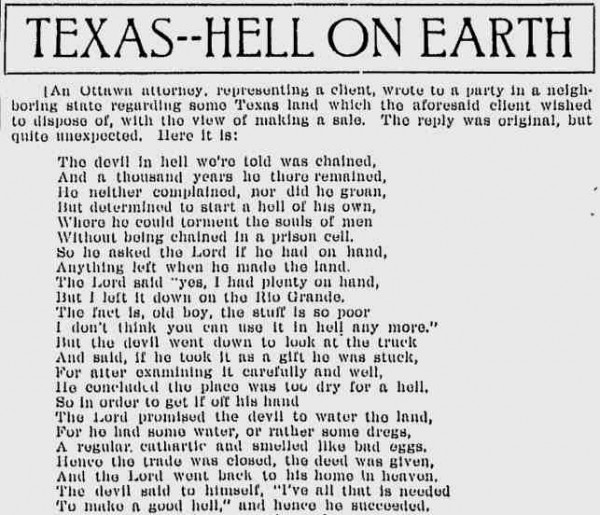
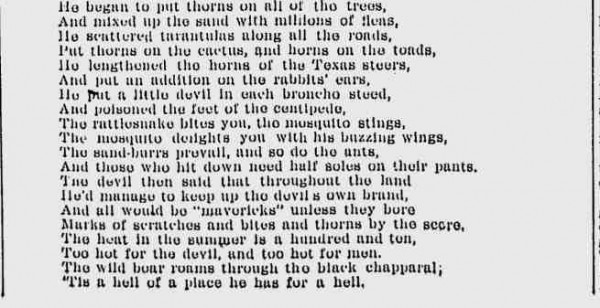
Source.
Posted By: Paul - Wed Jul 22, 2015 -
Comments (4)
Category: Law, Nature, Regionalism, Religion, Poetry, 1900s
Can-Fed Husbands

Shamokin News-Dispatch - Apr 1927
From Songs of a Housewife, by Marjorie Rawlings. It's an odd book of poetry, recording in verse all the various complaints and problems of 1920's housewives, such as husbands who complained about being given canned food.
Available at Amazon
Posted By: Alex - Fri Jan 16, 2015 -
Comments (5)
Category: Wives, Poetry, 1920s
Simultaneous discovery of sheep poetry?
In science, the phenomenon of simultaneous discovery, or "multiple independent discovery," is well known. The term describes how two or more researchers often independently discover the same idea, at around the same time. For instance, both Newton and Leibniz came up with the idea of calculus in the late 17th century, and both Darwin and Wallace developed the concept of evolution by natural selection in the mid-19th century.An example of this phenomenon might have recently occurred in the field of sheep poetry. Though whether it's simultaneous discovery or idea theft depends on whom you believe.

Cooper insists she was completely unaware of Laws' previous work, but Laws thinks it's more likely Cooper stole her idea, either consciously or subconsciously. Who to believe? Perhaps someone should ask the sheep what they think. [journallive.co.uk]
Posted By: Alex - Fri Apr 05, 2013 -
Comments (3)
Category: Animals, Poetry
Hiawatha
Enjoy a segment of one of the most-parodied poems in English.
I wonder what the official attitude of Native Americans is these days to Longfellow's work?
Posted By: Paul - Sun Jun 12, 2011 -
Comments (4)
Category: Stereotypes and Cliches, Poetry, Nineteenth Century
Henry Gibson, Redux
Race Relations Poem from Swindon Viewpoint on Vimeo.
I'm so pleased to see that people have continued to channel the spirit of Henry Gibson.
Posted By: Paul - Wed Mar 02, 2011 -
Comments (3)
Category: Poetry, 1960s
Follies of the Mad Men #103
Something different for this installment: an old postcard.Why would any casino want to depict their customer as a drooling cretin?
The verse on the back says:
AT SYSTEMS, MATH, COMPUTERS ALL, I'VE BEEN CONSIDERED APT.
BUT THEN I LAID MY MONEY DOWN, AND WHAT DO YOU KNOW..."I CRAPPED!"
Posted By: Paul - Wed May 19, 2010 -
Comments (3)
Category: Art, Poetry, Gambling, Casinos, Lotteries and Other Games of Chance

| Who We Are |
|---|
| Alex Boese Alex is the creator and curator of the Museum of Hoaxes. He's also the author of various weird, non-fiction, science-themed books such as Elephants on Acid and Psychedelic Apes. Paul Di Filippo Paul has been paid to put weird ideas into fictional form for over thirty years, in his career as a noted science fiction writer. He has recently begun blogging on many curious topics with three fellow writers at The Inferior 4+1. Contact Us |

